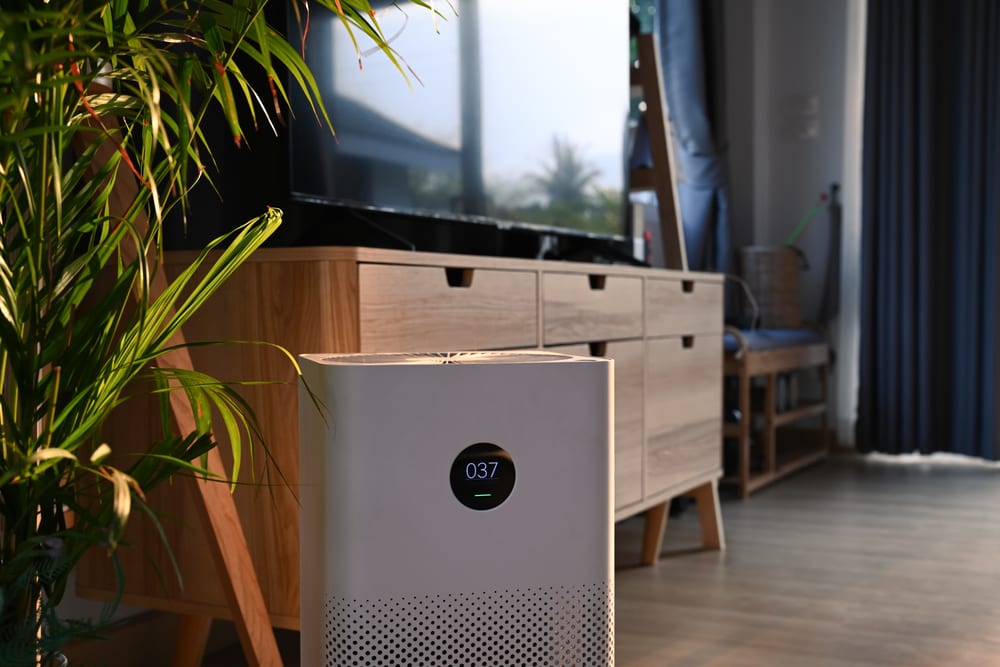Are you among the 50 million Americans who suffer from seasonal allergies? If so, you may have noticed that allergy season seems to have gotten longer and that your symptoms have worsened. Don’t worry; you are not alone.
A recent PNAS study reported a 21% increase in pollen concentrations. That same study found that the pollen season in the United States has increased by twenty days each year. Adding insult to injury, the pollen in our air has become more potent over time.
While this may be frustrating, do not be dismayed. There are some things you can do to improve your home’s air quality and control your allergy symptoms.
What You Can Do
While it might be tempting to lock yourself inside as much as possible, this isn’t a viable option for most people. Allergy specialists recommend that you:
- Shower and change clothes after being outside
- Wear sunglasses to protect your eyes
- Keep windows closed
- Wear a mask when outdoors
The most important step that you can take, however, is to improve the air quality in your home. Dust mites, pet dander, and pollen can all cause allergy symptoms. In fact, the EPA reports that indoor air can be up to five times more polluted than the air outside.
Let’s take a look at what changes you can make to improve your home’s air quality.
Invest in an Air Filtration System
Air filtration systems trap microscopic airborne particles that can cause allergy symptoms. These allergens include dust mites, cleaning chemicals, and mold spores. A filtration system works along with your air conditioning unit to improve the overall air quality in your Bondville, IL home.
Schedule an Air Duct Cleaning
Hire a professional HVAC technician to clean your home’s air ducts. Air duct cleaning removes all the dust, mold, and dirt that has gotten stuck in the ducts over time.
In addition to improving air quality and reducing allergy symptoms, having your ductwork cleaned helps your HVAC system operate more efficiently, as it isn’t having to fight against build-up in the ducts. This transfers into savings on your energy bill.
The NADCA recommends you have your air ducts cleaned every three to five years. You will need to have them cleaned more often if you:
- Have pets in your home
- Recently completed a renovation project
- Have had water damage to your HVAC system
A licensed professional can help you determine if you need more frequent cleaning.
Change Your Home’s Air Filters
A good air filter is your first line of defense against air pollutants and allergens. Every filter has a minimum efficiency reporting value. Also referred to as a MERV rating, this tells you the filter’s ability to remove harmful particles from the air.
Asthma and allergy sufferers should buy filters with a MERV rating of eight or higher. This means that they collect particles the size of three microns.
Electrostatic filters are another good option. These filters use an electric charge to filter out airborne contaminants. You can reuse them by cleaning them regularly with tap water.
High-efficiency particulate air filters also work well if you are battling allergies. Also known as HEPA filters, these filters use thin glass fibers to trap contaminants. They remove up to 99.97% of allergens and pollutants in the air.
As a general rule, you should change your home’s air filters every ninety days. Industry professionals recommend changing them more often during pollen season.
Heating and Cooling System Maintenance
Regular maintenance on your air conditioner removes dust and debris that gets trapped. This helps keep the system running smoothly and reduces the need for future repairs. As a result, your indoor air quality and energy efficiency both improve.
Manage Humidity
Studies indicate an environment with 30-50% humidity keeps allergens under control. If your home is dry and stale, like many Bondville, IL, homes, you should consider a humidifier system. This will help control your allergy symptoms and lower your risk of infection.
Eliminate Mold
Mold is a common household fungus that spreads best in damp environments. It eats away at organic materials and household surfaces. Some types of molds produce toxins. When breathed in, they can cause health issues, particularly for people with asthma and allergies.
If you notice water or dampness in your home, address it immediately. Water damage, excessive humidity, condensation, and leaky plumbing can all promote mold growth.
To prevent mold in your home, wipe surfaces with a mild dish soap. This removes the oils that attract mold. If you have a basement, keep the floors disinfected and free of any dampness. A humidifier will help keep humidity levels at the recommended 30-50%. You can also ask your HVAC professional about dehumidifiers.
Consider an Air Purifier
Allergy and asthma sufferers both benefit from air purification systems. Connected to your HVAC unit, this type of device removes airborne contaminants, leaving you with cleaner, safer air.
Deep Clean Your Home
Dust mites, pet dander, and pollen all contribute to asthma and allergies. To keep these allergens at bay, schedule a deep cleaning of your home regularly.
Protect your mattresses and pillows by using zippered protective coverings. Change your bed linens weekly and wash protective covers monthly.
Using a vacuum with a HEPA filter and mopping at least once a week is also important.
Check Your Home’s Radon Levels
Radon is a colorless and odorless radioactive gas. Inhaling it can cause health issues. Since you cannot smell it, testing is the only way to determine radon levels in your home. For homes testing positive for radon, the EPA recommends installing a radon mitigation system.
Groom Your Animals
Pet dander is a leading cause of indoor air pollution. If you have animals in the house, brush and wash them on a regular basis. If you suspect pet dander contributes to your allergies, washing them outside or taking them to a groomer is also recommended. You can also use air filters to help catch and remove dander from your air conditioning and heating systems.
Keep Your House Smelling Good Naturally
Everyone loves a clean-smelling house. But the fragrances used in air fresheners and laundry products release harmful chemicals into the air.
A recent test found that plug-in air fresheners emit twenty different volatile organic compounds. Also known as VOCs, these chemicals are not found on the product labels.
What Can You Do?
There are a couple of steps that you can take to help your house smell great:
- Switch to naturally-smelling or fragrance-free laundry products
- Look for mild cleaning products free of artificial fragrances
- Avoid aerosol sprays
- Open your windows to let fresh air in whenever the pollen count permits
- For a fresh smell, switch to baking soda and fresh lemons
Taking these simple measures will help improve the indoor air quality of your home.
Bring Nature to You
According to a NASA study, living plants act as natural air purifiers. Houseplants help filter pollutants stemming from:
- Trash
- Furniture
- Natural gas
- Carpets
- Cleaning products
- Woods
You will also get the added bonus of having a cozier indoor space. Research any plants before bringing them inside to ensure the safety of your children and pets.
Doormats
The amount of chemicals brought in by dirt from one’s shoes pollutes your home’s air. Place a large doormat at each entryway to ensure these pollutants stay outside. Another option is to leave dirty shoes at the door.
Improving Indoor Air Quality
Improving indoor air quality starts with awareness. Taking the time to care for your home and its equipment, including the HVAC system, will improve your quality of life. From air duct cleaning to humidifiers and purification systems, Castle Home Comfort Heating & Cooling is here to help. Contact us today to schedule an air duct cleaning and HVAC system check.

